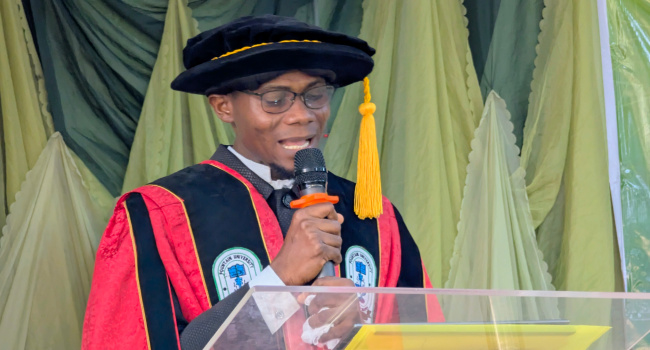Professor AbdulJaleel Shittu, a Professor of Information Science at Fountain University, has called for a comprehensive rethink of Nigeria’s Information and Communication Technology (ICT) landscape.
He made this assertion during the institution’s 5th inaugural lecture themed “Like Musa’s Staff, Like Nation’s Staff: ICT As A Tool For Development.”
The lecture emphasised the need to revisit the country’s reliance on Information Technology Outsourcing, which Prof. Shittu argued prevents organizations from focusing on their core mandates.
He urged government agencies to shift from rhetoric to action by adopting project-based approaches that develop and customize ICT services for industrial and educational needs.
Highlighting the importance of strategy, Prof. Shittu recommended the adoption of the “4Rs” approach — Refocus, Re-analyze, Re-engineer, and Re-assess — as a framework for addressing ICT deployments and developments in the country.
Prof. Shittu also expressed concerns about the growing distraction posed by ICT gadgets, particularly mobile phones, to students and young learners.
He advocated for the introduction of Customized Learning Gadgets (CLG) tailored to sustain the attention of young people beyond conventional classroom settings.
ALSO READ: Taxes, not tool for economic growth — Senator Musa
In his lecture, he emphasised the potential of ICT in driving economic growth through virtual tourism, proposing that campus virtual tours could be an effective starting point to showcase the nation’s educational and cultural assets.
To bridge the digital divide in rural areas, Prof. Shittu called on both government and private entities to establish telecentres, ensuring that rural communities benefit from ICT beyond basic phone usage.
As technological advancements like Artificial Intelligence (AI) continue to redefine industries, Prof. Shittu emphasised the need for the agricultural sector to adopt AI-driven practices.
He suggested re-energizing traditional farming techniques with modern AI solutions for better productivity and sustainability.
He also proposed the integration of ICT-based safety applications, such as fire detectors with alarm systems, to enhance household and industrial safety.
Furthermore, he championed the reintroduction of hieroglyphics (Aroko) as a memory-stimulating tool to foster native intelligence in contemporary education.
“By equipping the environment with adequate devices such as fire detectors combined with alarm and alert systems, ICT-based applications can significantly enhance and improve household, industrial, and personal safety and growth.
“As a means to ensure personal safety and development, the reintroduction of hieroglyphics (Aroko) as a knowledge-based image representation should be prioritised, as this could stimulate memory and foster the native intelligence that is increasingly lacking in contemporary education.
“In order to achieve better performance in geography and other similar subjects, mobile-based Augmented Reality Instructional Technology (ARIT) should be adopted and adapted to specific environments,” he recommended.
READ MORE FROM: NIGERIAN TRIBUNE
Get real-time news updates from Tribune Online! Follow us on WhatsApp for breaking news, exclusive stories and interviews, and much more.
Join our WhatsApp Channel now
